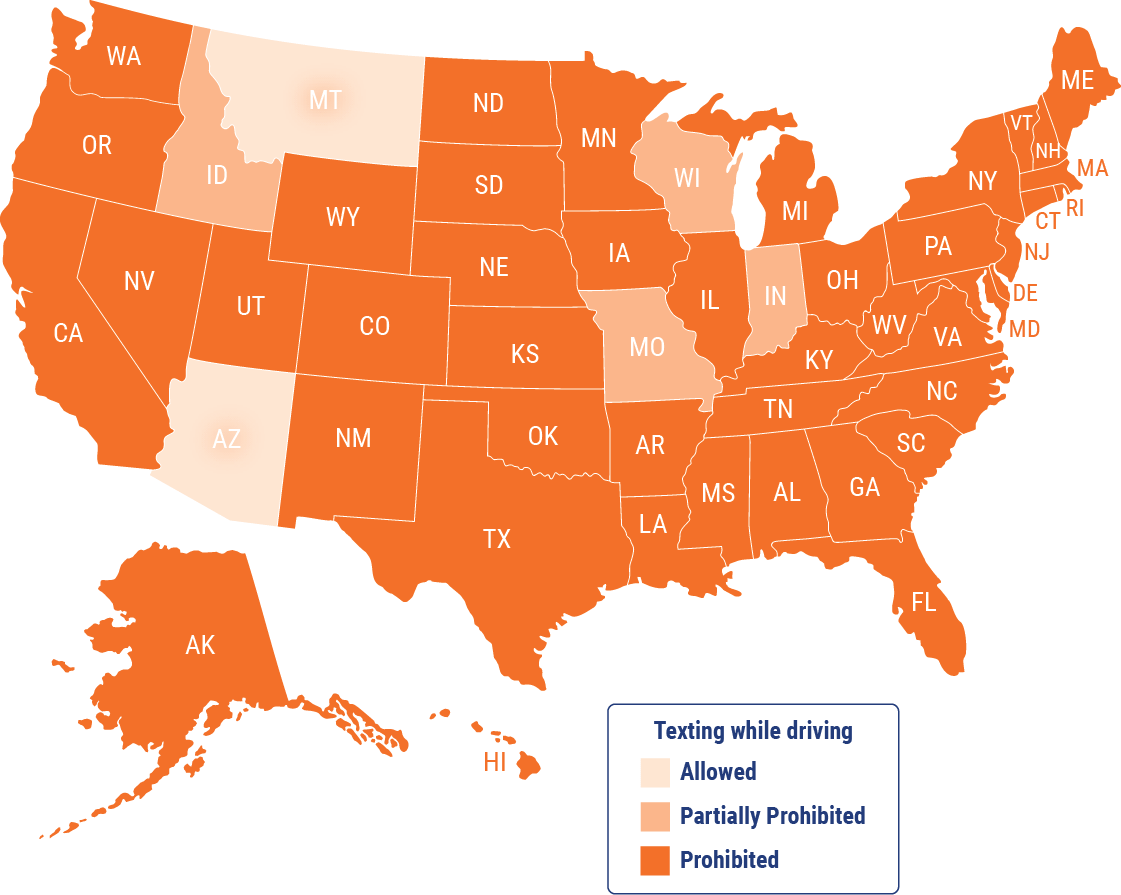Florida Distracted Driving
(It's more than just not texting.)

There are approximately 400,000 car accidents a year in Florida. Most accidents are the result of driver error and are fully preventable. One of the most important things you can do as a driver in Florida is to keep your attention focused on the task of driving so that you do not become distracted.
What Is Distracted Driving?
The Florida Department of Transportation defines distracted driving as “anything that takes the driver’s attention away from the vital task of driving.” There are three types of distractions that drivers should be aware of:
- Manual: This is anything that causes you to take your hands off the wheel.
- Visual: This is anything that causes you to take your eyes off the road.
- Cognitive: This is anything that causes you take your mind off the task of driving.
Most distracted driving actions, while dangerous, are perfectly legal. This includes arguing with passengers, checking your makeup in the rearview mirror, and adjusting temperature controls.
Currently, in Florida, lawmakers are focused mainly on preventing distracted driving accidents that are caused by texting while behind the wheel.
Distracted Driving Statistics in Florida
- Florida has been cited as the 2nd worst state for distracted driving.
- Distracted driving is responsible for nearly 50,000 crashes a year in this state.
- That is an average of 137 distracted-driving crashes a day.
- More than 200 people are killed every year in Florida due to distracted driving accidents.
Does Florida Have Laws against Distracted Driving?
Yes.
Currently, the state of Florida prohibits:
- Reading, writing, or sending text messages while driving
- The use of handheld cell phones in active school zones
- The use of handheld cell phones in active work zones

Are There Any Exceptions to the Distracted Driving Laws in Florida?
Yes.
In Florida, drivers are permitted to send and receive text messages while the vehicle is not in motion. This means it is okay to do so while at red lights or stopped in traffic. Also, the restriction on handheld cell phone use in work zones is enforced only when workers are present in these zones.
Additionally, Florida’s distracted driving laws do not apply to:
- Operators of authorized emergency vehicles (law enforcement, fire service, or emergency services professionals) while they are performing official duties
- Drivers who are using their device to report emergency, criminal, or suspicious activity to law enforcement authorities
- Drivers who are receiving messages that are related to the operation or navigation of their vehicle or safety-related information. This includes: emergency, traffic, or weather alerts; data used primarily by the motor vehicle; or radio broadcasts.
- Drivers who are using GPS or other navigational systems
- Drivers who are texting using voice-to-text hands-free technology
- Drivers who are operating an autonomous vehicle in autonomous mode
Florida Distracted Driving Laws at a Glance
| Yes | No | |
| Is texting while driving legal? | X | |
| Can you send/receive texts at a red light? | X | |
| Is handheld device use permitted? | X * | |
| Any special restriction for young drivers? | X | |
| Is headphone/headset use permitted? | X ** |
* Effective October 1, 2019, hands-free is required in active school zones and work zones
** Headphones, earbuds and headsets permitted when used in one ear only
Is It Legal to Eat a Cheeseburger while Driving in Florida?
Yes. However, it is not advisable to do so.
Distracted driving comes in many forms. From actions like texting or watching a video to the less obvious distractions of searching for your sunglasses or munching on French fries, anything that takes your attention away from the task of driving presents a hazard.
So, what happens if a police officer in Florida spots you eating a cheeseburger while driving down the highway? In most cases, nothing. There is no law that specifically states that you cannot eat while driving in this state.
However, eating a cheeseburger can cause you to drive erratically or to lose focus and commit a moving violation, such as running a stop sign, and you could be pulled over for that. If that happens, you may be pulled over and fined for the moving violation you committed.
Unless you are really in a hurry, you’d be better off eating your cheeseburger indoors or while parked in the parking lot.
What Is the Difference between Primary and Secondary Enforcement of Distracted Driving Laws?
Primary enforcement of distracted driving laws means that the police can pull you over if they see you violating state distracted driving laws.
Secondary enforcement of distracted driving laws means that the police can cite you for violating distracted driving laws only if you break another law while doing so.
Florida uses primary enforcement.
This was not always the case. Until July 1, 2019, this state’s laws only allowed for secondary enforcement, and this hampered law enforcement efforts to make the roadways safer by limiting distracted driving.
Now, police officers are able to pull people over if they are using their cell phones while driving—even if they are in full control of their vehicles.
What Is the Penalty for Distracted Driving in Florida?
The penalties and fines for distracted driving in this state are as follows:
- A first offense is a non-moving violation. It is fined $30 plus court costs and fees. No points are assessed against the driver’s license.
- Subsequent offenses, if committed within five years of the previous offense, are considered moving violations. They are fined $60 plus court costs and fees, and 3 points are assessed against the driver’s license.
- Effective October 1, 2019, using a handheld device in a school zone is a moving violation, even if a first offense. It is fined $60 plus court costs and fees and adds 3 points against the driver’s license.
Florida's fines for distracted driving compared to surrounding states

The cost for a distracted driving ticket may seem low, but once you add in court costs and fees, the real cost of this offense can really add up. In many Florida counties, these added fees can bring the actual cost of that $30 ticket to more than $100.
Does Distracted Driving in Florida Increase Insurance Rates?
A first offense is not likely to affect your insurance rates since it is not considered a moving violation and no points are assessed against your driving record. However, if you are cited for this violation a second time within five years, you will have points and a moving violation on your record.
This can lead to a significant increase in your car insurance rates. Additionally, a distracted driving citation can cause you to lose your good driver discount if you have earned one, and this can make your rise in premiums even more painful.
What If I Drive into Alabama or Georgia?
Distracted driving laws vary by state, so if you drive into a neighboring state that has different laws, you may wonder how these laws pertain to you, as a Florida resident.
The laws in Alabama and Georgia are different from those in Florida. Alabama imposes cell phone restrictions on drivers under 18.
That means that if your teen driver crosses the border into Alabama, they will need to end any phone calls they may be making at the time, or they could be cited for a distracted driving violation.
Additionally, Georgia does not allow the use of handheld cell phones at all, and, in fact, makes all forms of distracted driving technically illegal, including eating. Keep that in mind next time you are munching on fast-food fries while driving.
Any time you drive into another state, you are required to comply with their laws. Claiming ignorance of the law will not get you out of a ticket, so be sure to review the laws of other states before taking a car trip.
What Is Florida Doing to Prevent Distracted Driving?
Lawmakers in this state continue to work toward making this a safer place for motorists. In the summer of 2019, the state of Florida enacted tougher laws and restrictions when it comes to distracted driving.
The Florida Department of Highway Safety and Motor Vehicles partnered with the Florida Department of Transportation and law enforcement to present the Put It Down: Focus on Driving campaign.
This campaign was designed to educate Floridians about the changes to the law and the dangers of distracted driving.
https://www.fdot.gov/safety/2a-programs/distracted-driving.shtm
https://flhsmv.gov/pdf/crashreports/crash_facts_2017.pdf
http://www.flsenate.gov/Laws/Statutes/2013/316.305
